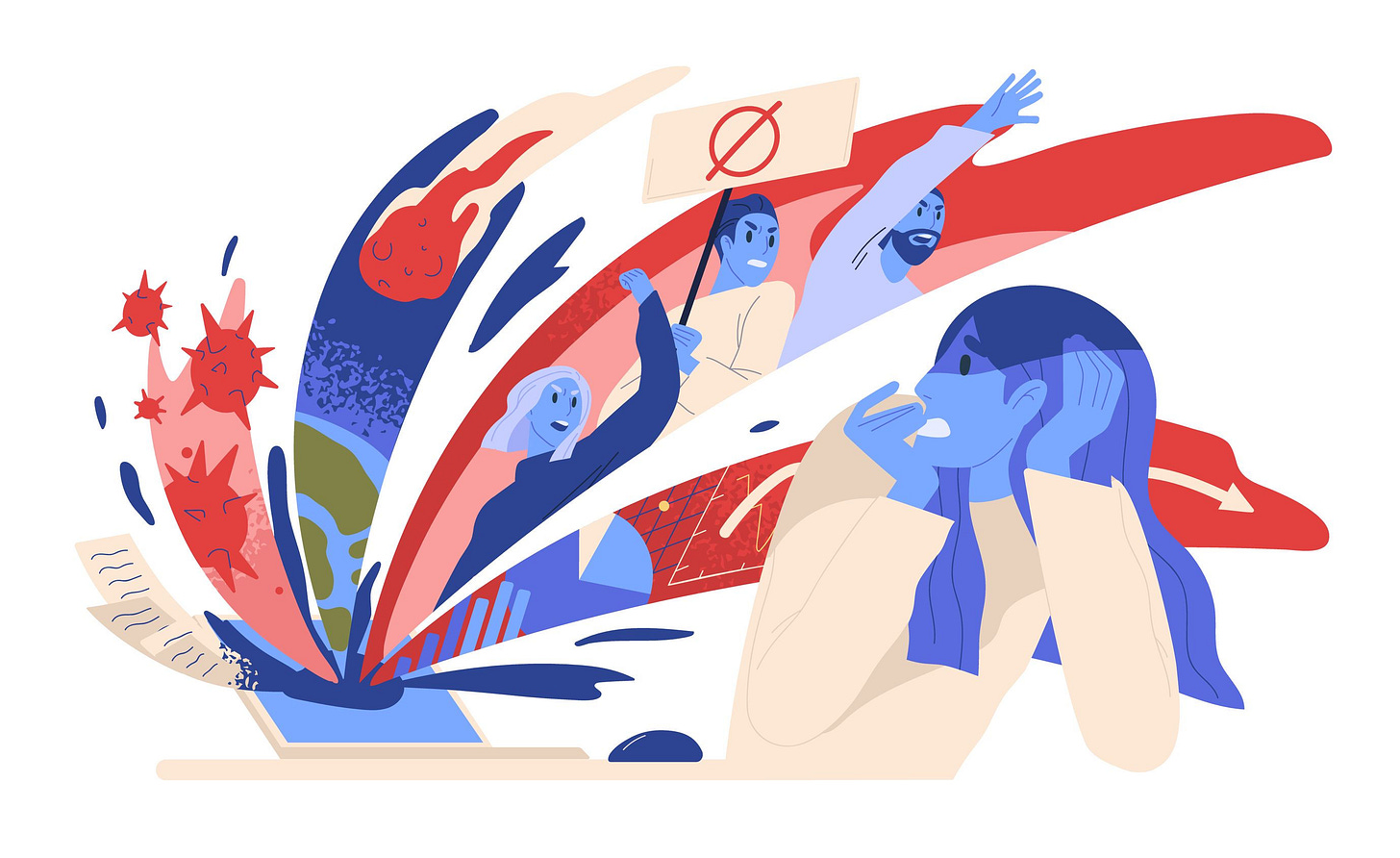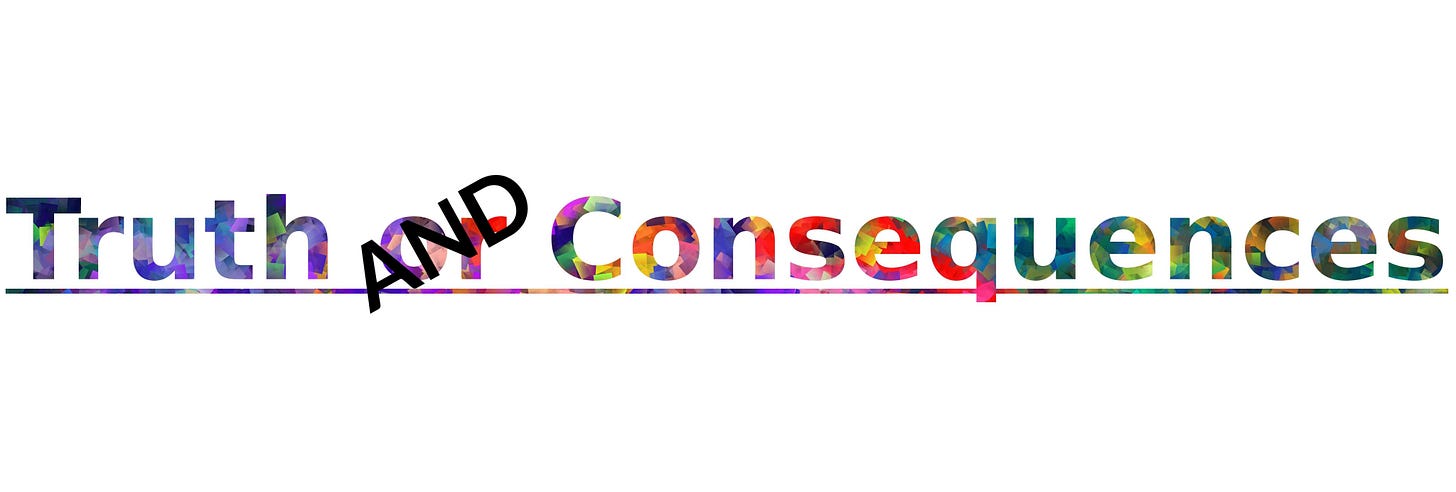E-Pluribus | September 21, 2022
Another installment of Everything is Political, Truth *and* Consequences, and DEI statements as job requirements.
A round-up of the latest and best writing and musings on the rise of illiberalism in the public discourse:
Danielle Carr: Mental Health Is Political
Everything else seems to be political these days, so why not mental health too? Dr. Danielle Carr, assistant professor at U.C.L.A., writes at The New York Times that whatever the solutions are to Americans’ mental health issues, our current tendency to politicize everything cannot be dismissed out of hand.
The mental health toll of the Covid-19 pandemic has been the subject of extensive commentary in the United States, much of it focused on the sharp increase in demand for mental health services now swamping the nation’s health care capacities. The resulting difficulty in accessing care has been invoked widely as justification for a variety of proposed solutions, such as the profit-driven growth of digital health and teletherapy start-ups and a new mental health plan that the Biden administration unveiled earlier this year.
But are we really in a mental health crisis? A crisis that affects mental health is not the same thing as a crisis of mental health. To be sure, symptoms of crisis abound. But in order to come up with effective solutions, we first have to ask: a crisis of what?
Some social scientists have a term — “reification” — for the process by which the effects of a political arrangement of power and resources start to seem like objective, inevitable facts about the world. Reification swaps out a political problem for a scientific or technical one; it’s how, for example, the effects of unregulated tech oligopolies become “social media addiction,” how climate catastrophe caused by corporate greed becomes a “heat wave” — and, by the way, how the effect of struggles between labor and corporations combines with high energy prices to become “inflation.” Examples are not scarce.
[ . . . ]
Before we go further, let me be clear about what I am not arguing. I am not arguing that mental illnesses are fake, or somehow nonbiological. Pointing out the medicalization of social and political problems does not mean denying that such problems produce real biological conditions; it means asking serious questions about what is causing those conditions. If someone is driving through a crowd, running people over, the smart move is not to declare an epidemic of people suffering from Got Run Over by a Car Syndrome and go searching for the underlying biological mechanism that must be causing it. You have to treat the very real suffering that is happening in the bodies of the people affected, obviously, but the key point is this: You’re going to have to stop the guy running over people with the car.
Read it all here.
Martin Gurri: Truth and Its Consequences
The quest for “truth” has stymied humans for millennia. At Discourse Magazine, Martin Gurri dives deep into the topic of truth as well as its consequences depending who is defining it and how.
“Post-truth” is the inevitable consequence of information overabundance. For every fact, there is a counter-fact. For every assertion, there is a refutation. A desolate information landscape is shaken by billions of screaming voices, as the human need for recognition turns against itself and nullifies itself. Steve Fuller considers “post-truth conditions” to be more democratic and market-like than the elite-controlled system of the last century. Fuller is right in one respect: The guardian class is in panicked retreat and its monopoly hold over the narrative has been lost forever. But what is left behind looks less like a democratic assembly than a void, a nothingness, in the shadow of which obscure oracles and barbaric war-bands have sought to dominate.
Our disputes are no longer about the interpretation of reality but about the very frameworks of interpretation. Every attribute, even “democratic” and “market-like,” is framework-dependent—and how are we to judge between competing frameworks? Decisions of that kind, Kuhn informs us, can only be made on faith. And how are we investing the wonderful human capacity for belief? The antifa believe that the United States is a new version of Nazi Germany. The disciples of QAnon believe that the federal government is controlled by a ring of pederasts. Black Lives Matter activists believe that slavery and Jim Crow never ended. It is, quite literally, impossible to judge, but let me offer my opinion that these professions aren’t acts of faith but of anti-faith, of nihilism—a surrender to nothingness and the void.
[ . . . ]
It strikes me as self-evident that truth is, and ought to be, the servant of life. That’s the arrow of causation for human evolution. We may wonder why we haven’t evolved to be receptacles of perfect knowledge, each of us a philosopher-king. But what would be the point? Our heads would be stuffed with data but we wouldn’t be more likely to survive in a dangerous and haphazard world—possibly less.
There is a difference between truth and conception, between knowing and understanding. The riddle of existence is solved by each individual with a variable mix of fact and faith. You don’t need a college degree to become a moral exemplar. An untutored person can be a devoted spouse and an excellent parent. Conversely, we have before us an endless parade of experts who turn out to be bullies or sexual predators, on the model of Harvey Weinstein and Jeffrey Epstein.
Read the whole thing.
Emma Camp: Want An Academic Job? Start Preparing Your DEI Statement.
A degree? Check. Experience? Check. Letters of recommendation? Check. DEI statement? Wait, DEI statement? Emma Camp at Reason says the chances are increasing that someone applying for a job in education will be asked to provide or agree to some version of a Diversity, Equity and Inclusion statement as part of the hiring process, a requirement that raises concerns about academic freedom.
Last week Tablet magazine published an overview of the phenomenon, written by John Sailer of the National Association of Scholars. "It's conceivable that job candidates could list their plans to contribute to diversity and inclusion without indicating a commitment to any particular political or social viewpoint, but the most commonly available rubrics for assessing diversity statements demonstrate a clear ideological gloss," he reported. Berkeley's rubric, for example, gives a low score to any applicant who "states the intention to ignore the varying backgrounds of their students and 'treat everyone the same.'"
[ . . . ]
Many schools' guidelines for mandatory diversity statements are thinly veiled ideological litmus tests. For example, the Board of Governors of the California Community College system, which Sailer notes is "the nation's largest system of higher education, governing 116 colleges that together enroll 1.8 million students," recently approved changes to its employee evaluation policies. Among its criteria: a "race-conscious pedagogy and/or curriculum."
This poses a clear threat to academic freedom. Mandatory diversity statements, particularly when specific versions of "diversity" are explicitly preferred, can have a chilling effect on faculty who disagree with the approach. And when institutions, such as the University of North Carolina School of Medicine, require instructors to write about their specific actions to bolster DEI efforts, they raise of the spectre of punishing faculty who aren't interested in becoming diversity activists.
Read it all.
Around Twitter
Katie Herzog and Jesse Singal call out Parker Molloy for her recent conversion on cancel culture:
Has our society ceded too much power to online payment companies? Maybe clicking “agree” without reading those long, fine-print Terms of Service all these years was a mistake:
And finally, the people of Iran are fed up. Again.










